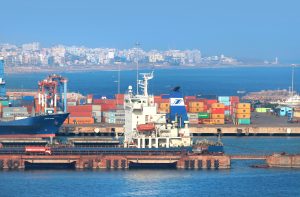The Diplomat author Mercy Kuo regularly engages subject-matter experts, policy practitioners, and strategic thinkers across the globe for their diverse insights into U.S. Asia policy. This conversation with Elisabeth Braw – a senior fellow at the Scowcroft Center for Strategy and Security, Atlantic Council, and author of “Goodbye Globalization: The Return of a Divided World” (Yale 2024) – is the 431st in “The Trans-Pacific View Insight Series.”
Explain how geopolitical threats are impacting companies with global reach.
Over the past 35 to 40 years, global companies have been expanding far beyond Western markets into major markets, such as China and Russia. Now these countries, especially Russia but also China, have increasingly become more hostile toward foreign companies that could either be competitive with national companies or are perceived as a conduit of Western values and norms.
Companies continue to need a global presence for their bottom line but are caught in the middle of the world’s growing geopolitical tension. That means that for many companies, having a global presence is both an asset and a risk. For example, running manufacturing operations in China risks exposure to geopolitically motivated retaliation by the Chinese government. The number of Western companies punished by Chinese governments for actions or statements by their home governments is increasing, and in Russia, the authorities have already expropriated a large number of Western firms’ assets. Globalization was not supposed to operate this way.
How should companies factor geopolitical uncertainty into their risk management?
Companies are rapidly becoming concerned about geopolitical risk. A key indicator of this concern is the increasing number of companies that sign political risk insurance policies. The challenge for international companies is to reduce exposure to political risk in risky but lucrative markets, with China as a primary example.
Business leaders should understand that their businesses are not seen as neutral entities but are being seen by governments like those of Russia and China as affiliated with the country where they are headquartered. This means that Australian companies, for example, need to closely follow what the Australian government says or does, as its actions can cause the Chinese government to retaliate against Australian companies as proxies for their home government. This happened during COVID-19 when China reacted to statements by then-Prime Minister Scott Morrison by imposing punitive tariffs on Australian wine. International business now operates in the realm of geopolitics.
How should companies prepare for possible conflict in the Taiwan Strait or South China Sea?
They need to make sure their supply chains are diversified. The Fukushima earthquake 13 years ago is a case in point. In Fukushima prefecture, there was a crucial supplier to the automotive industry, and this company was so good and so reliable that it was automotive companies’ single supplier of one particular product. When the tsunami and earthquake hit and the company was affected, automotive supply chains were disrupted too.
Companies should conduct risk scenario exercises to prepare for potential disruption to Taiwanese operations, which could be affected by a Chinese blockade in the Taiwan Strait. It is important to explore efforts to duplicate Taiwanese operations offshore, and this is something some Taiwanese companies are already working on.
How should the private and public sectors coordinate and communicate in a geopolitical threat scenario that could threaten capital markets, infrastructure, shipping lanes, and supply chains?
The public and private sectors should coordinate preparations for managing and mitigating disruption. Governments should launch exercises involving new national security threats and invite companies to participate. This way they’re better prepared when crises hit, and it also allows them to demonstrate to adversaries that it’s not worth the effort of trying to harm their societies.
Identify the top three geopolitical threats for which companies should prepare contingency plans and risk mitigation measures.
Supply chain disruption is a serious threat. Another is geopolitically motivated retaliation: a hostile government retaliates against a foreign company operating in the country for actions taken by that company’s home government, which is what happened to Australian winemakers. Other geopolitically linked threats companies should take seriously are hostage diplomacy involving expat staff, random raids and detentions, and imposition of Chinese national security laws on foreign targets. And let’s not forget geopolitically linked attacks on global shipping. The Houthis are demonstrating that this is a threat to be taken very seriously.

































